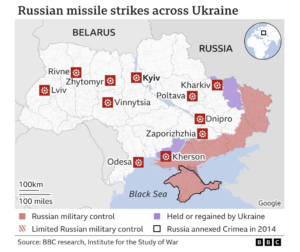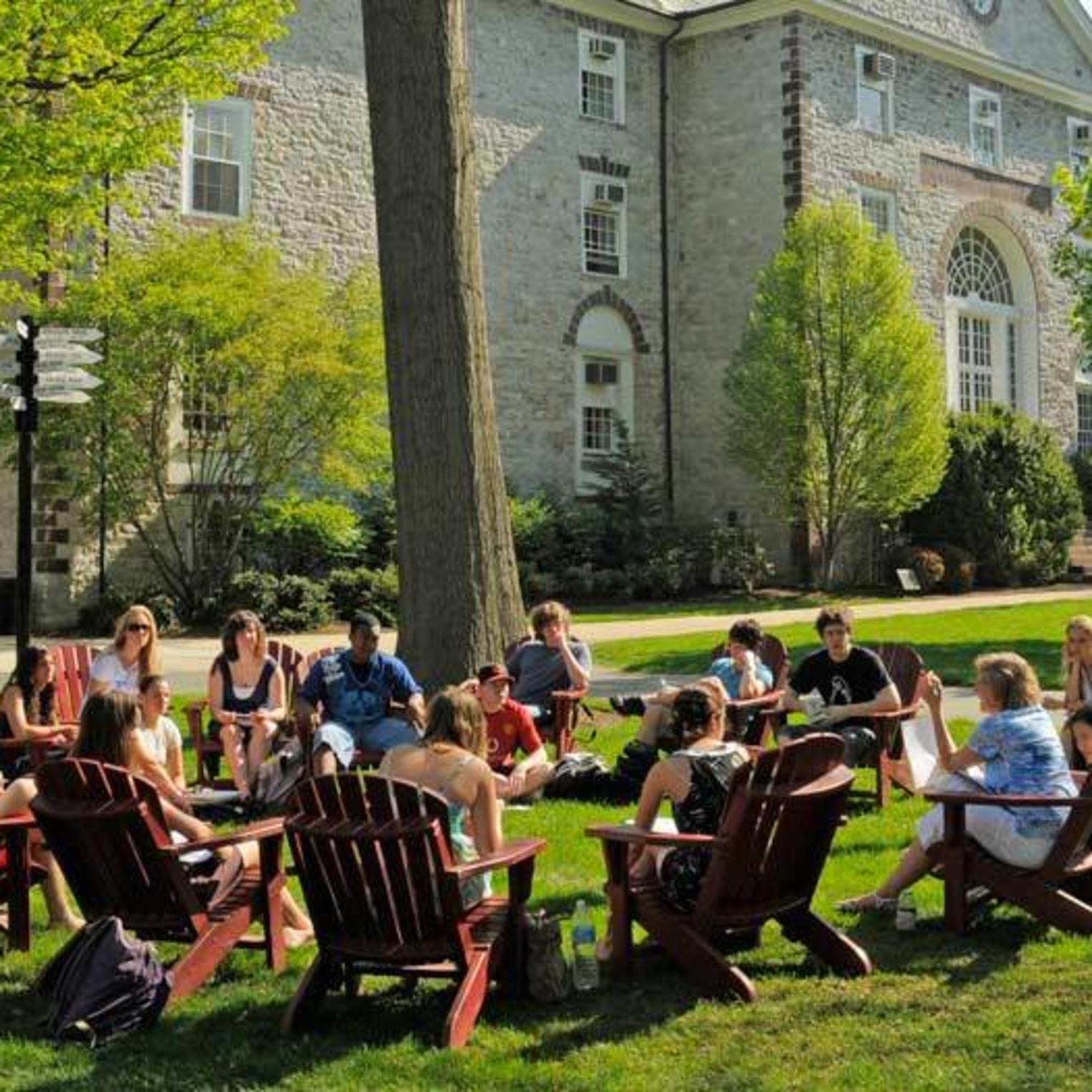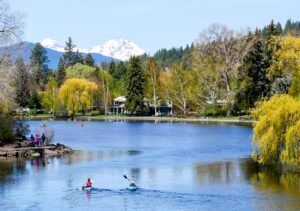Clark Forum: Paradigm Lost
April 30, 2023
By attending the Clark Forum Paradigm Lost, I gained a much better understanding of the history of the land currently contested by Israelis and Palestinians, and the conflict between the two groups. The full historical analysis helped me understand the reasons for the conflict today, and how world events such as World War Two affected the region. Through Professor Lustick’s careful explanation of the issues at hand and the ways that governments have approached the resolution of the problems, I was able to understand his argument. His solution argued that Israel will never be divided into two states, and what is required is a more in-depth solution emphasizing equal rights.
One concept he mentioned that I could relate to class was the U.S. role in the Oslo Accords. Professor Lustick described how complex the conversations were, using maps to further his point. It helped me understand visually why he believes in a one-state solution. I was also able to connect the lecture with broader topics we have discussed like countries’ and the UN’s role in fostering diplomatic talks. However, he notes a cyclical pattern of violence and unsuccessful negotiations. In addition, I connected our previous discussions on the aftermath of the World Wars and colonialism to the events occurring in Israel today.
With limited knowledge on the issues, and having heard only his perspective, I can say I found the latter part of his argument persuasive. However, I am not knowledgeable enough on the topic to understand possible counterarguments, or raise any disagreements. His description of a seemingly never-ending timeline in which the two-state solution will no longer be viable was effective as a learner to understand the sorts of debates revolving around the issue. Therefore, Professor Lustick not only had a persuasive argument, he was also able to explain a deeply complex issue to attendees who might have little knowledge on the conflict.
Factors That Encourage SDG progress
April 30, 2023
Prompt:
How do national and international factors interact in empowering some states of the Global South to make more progress toward the UN Sustainable Development Goals than other states?
After completing our group project on Sri Lanka and participating in the Zoom meeting I gained better insight into national and international factors that empower states of the Global South to make more progress toward the UN Sustainable Development Goals. Factors related to SDGs often interact. For the purposes of this post domestic factors like transparent government and natural resources will interacts with international factors like trade, and states demonstrate varying levels of success.
While researching Sri Lanka I found that corruption significantly limited progress on sustainable development goals, because it created income inequality and poor economic policies. In the Zoom meeting, many other groups connected high corruption to poor SDG progress, such as in Bangladesh, which fails to achieve some of the fundamental purposes of government. By contrast, Singapore offers government programs that sponsor transparency. Their impressive progress on the SDGs can be primarily attributed to the successful implementation of goal 16, peace justice, and strong institutions. The importance of government transparency is crucial to making SDG progress from a foundational standpoint. The transparency in government and fund usage is especially important in managing industries that have the capability to produce economic growth.

https://toolkit.climate.gov/image/3477
One industry that governments interact with through policy and regulation is natural resources. Resources like petroleum in Turkey and fish in Sri Lanka provide work and income for citizens. However, petroleum in Turkey has been a significant export, allowing for growth in the face of economic crises like the pandemic. Whereas fisherman in Sri Lanka still have access to the natural resource, inflation makes fishing equipment so expensive that their is little economic growth for citizens. Industries based on natural resources can create consistent work opportunities, amongst other things, but strong institutions are required to ensure that such resources are managed in ways that promote the different aspects of goal eight. In addition to that, countries like Singapore, which need natural resources like fresh water, must maneuver international trade markets to ensure that they have access to such an important resource.
Trade has been a consistent factor in connecting domestic markets of countries to international factors. From natural resources like petroleum, lithium, and water to manufactured goods like textiles, trade bolsters the economy and growth in many of the countries. In addition, countries have to build strong relationships with other countries to maintain trade relations. Trade is a consistent factor that helps with the economic implementation of sustainable development goals. However, strong institutions are needed to ensure proper management of the resources, and what level of government intervention is needed in markets. Therefore, all of these factors closely interact, but countries must be strategic in management to ensure that growth occurs.
Clark Forum: War in Ukraine
April 22, 2023
The Clark Forum about Russia’s war in Ukraine introduced information that I would have struggled to understand from the news individually. It was helpful to hear each of the professors’ insights, specifically on international relations and the predictions some of the professors made about the upcoming months. Logistical problems such as training on weapons from other countries and the need for ammunition for specific guns helped me understand the multiple factors that impact each aspect of the war. That, paired with the possibility of waning political, economic, and military support in the West for the war has the potential to create challenges for Ukraine. It reminds me of recent class discussions on the domestic influences on US involvement in international conflicts.

https://www.bbc.com/news/world-europe-60506682
One aspect of the presentation I found very interesting was the noting of the EU as a shifting institution, which is now providing military aid to Ukraine. We have spoken in the past about institutions shifting over time or in response to world events, such as the growing institutional effectiveness in the post-Cold War world. Nevertheless, learning about a current example illustrated how institutions must change in response to the world around them and that they are not stagnant entities. In addition to that, I found the section on economic sanctions and their historically low success rates very informative. After the onset of the war, I remember economic sanctions as one of the most discussed topics on the news, but hearing that they have low rates of success was new to me, and changed the way I think about support from the US in response to the conflict.
Overall, I found the lecture very informative but would have liked to hear more specifically about institutions, and how they might continue to play a role in the conflict.
Impacts of Othering
February 20, 2023
Prompt: Taking the concepts of self and other, think about your community (your home, your college or university, some other community in which you are involved) and consider who belongs and who is an outsider. What group or groups do you experience primarily as plural others, rather than as individuals? How does that affect your perceptions of them? What are the social and practical effects of othering?
People are considered other for many reasons in my hometown. Generally, anyone considered other didn’t participate in the necessary activities or dress in such a way that would make someone socially mainstream. But in this case, every person is likely an other somehow. Therefore, it seems this is more surface-level othering based upon interests such as a hobby or friend group. Othering in my hometown had more to do with social engagement than identity factors such as religion or background. Regardless, I often considered the athletes in my high school as plural others as I was more engaged in the arts and music. I didn’t think poorly of them, I just was never around them often enough that I considered them differently. It is possible that from their point of view, I was an other who didn’t belong in sports settings. Because of the multiple cliques in high school, students were often sort of inside outsiders who were generally bound by a shared community in school while having little in common with most of the student body.
Unfortunately, language also makes people insiders and outsiders in my hometown in Oregon. Many only speak English, and people often presume that others should be able to speak it or there are limited resources for those who do not. Due to a lack of resources for non-English speakers, they can be marginalized. The effect of this othering would be that some may be unjustly treated differently and denied the benefits of services and activities due to a language barrier. I can say undoubtedly that Dickinson is more linguistically diverse than my hometown in Oregon, and I am amazed at how many different languages I hear students and faculty speak on campus. I hope that one day my hometown and those within will benefit from more spoken languages that can open up communication possibilities.

https://www.visitcumberlandvalley.com/listing/dickinson-college/972/
Additionally, othering at Dickinson takes a different tone. I am a new student, so I have yet to grasp the social landscape fully, but the scope of belonging seems broad, with fluid social groups. The factors that make someone belong or others are more complex. This difference means that others are people I don’t know yet, not specific groups of people with commonalities between them. It also seems that in college, people are free to pursue more specific interests, which leads to students engaging in a wide array of activities, unlike those in high school.
Socially speaking, I think “othering” has the potential to limit personal growth and deter people from meeting new friends and expanding their comfort zones. When other people can see the individual instead of the other, they get closer to building connections. This shifted viewpoint means that practically someone can appreciate what makes people different. Recognizing that everyone has different challenges to face will make it easier to support and understand them. I hope that this support and understanding extends to practicality through institutional resources.
Cultural Comparisons
February 6, 2023
| “Reflect on the differences between where you grew up or where you live now and where your exchange partners live. Some factors to consider here are the universal and the particular, environment and culture.” |
When I began the meeting, I had anticipated a discussion into the similarities and differences between the United States and the United Arab Emirates regarding food, the weather, or maybe classes. Although we did initially talk about the weather and the difference between the cold climate in Pennsylvania and the dunes, cities, and mountains in the United Arab Emirates, the following topic in my opinion was much more interesting.
Surprisingly, our conversation began to take a quick but welcome turn into the nature of our communities, and culture. In my case, I could compare the relatively small town I grew up in and the tight-knit communities my peers had experienced in their homes in the UAE. We had many similarities, such as the feeling that our parents and family knew everyone and everything happening in our neighborhoods. It brought to mind shopping with my parents and being held up by every childhood friend and acquaintance stopping to say hello.

https://www.erikastravels.com/things-to-do-in-bend-oregon/
Among these similarities were other feelings of pressure to succeed, perhaps from friends and parents due to the small size of the communities in our hometowns. Maybe it allows easy examples for parents to compare successes.
We also discussed our schools and the fact that we were, as evident by this meeting, connected by our political science course. We found differences though, in the possible rigors of the schooling curriculum, as one of the group members who had experienced both pointed out. We shared similar struggles with our peers, especially when facing the pressure to look and act a certain way.
I initially imagined many differences, perhaps due to the distance between the two countries. However, I was pleased to find that we discussed far more similarities than differences.